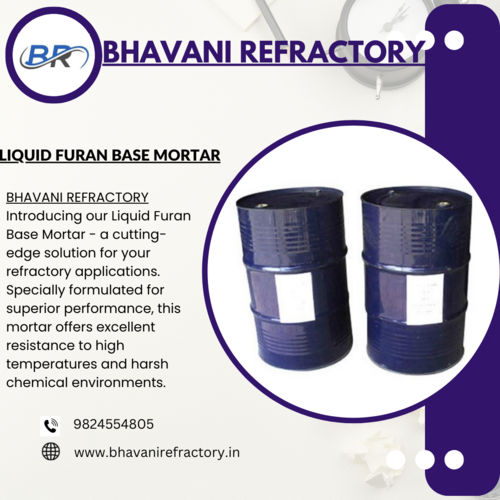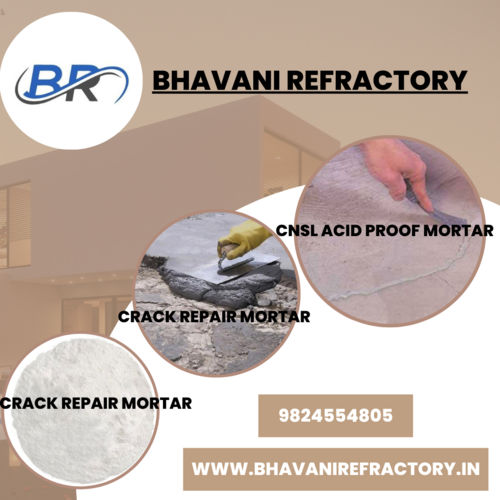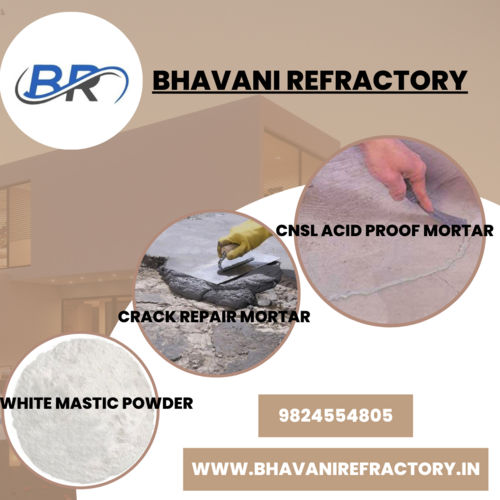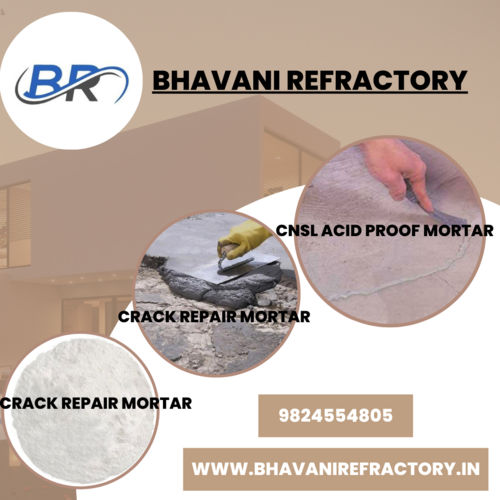Call Us
08045800126Carbon Filled Mortar
Price 230 INR/ Kilograms
Carbon Filled Mortar Specification
- Surface Finish
- Smooth
- Density
- 2.10 Gram per cubic centimeter(g/cm3)
- Usage & Applications
- Acid proof construction, battery room lining, chemical process industry, glass furnaces
- Hardness (%)
- 90%
- Purity(%)
- 95 99%
- Water Absorption
- Below 1%
- Application
- Used for chemical plants, glass tank furnace, acid resistant lining, and battery room lining
- Chemical Composition
- Carbon, Silica, Binder
- Melting Point
- Above 1700C
- Form
- Paste/Ready Mix
- Product Type
- Refractory Mortar
- Types of Refractories
- Acid Resistant, Carbon Based
- Shape
- Powder/Mortar/Slurry
- Porosity
- Low
- Dimensional Stability
- Excellent up to service temperature
- Strength
- High compressive strength
- Specific Gravity
- 1.90 2.10
- Thermal Conductivity
- Low
- Color
- Black
- Maximum Service Temperature
- Up to 1800C
- Toxicity
- Non-toxic under normal condition
- Corrosion Resistance
- Excellent against acids and chemicals
- Storage Condition
- Store in cool, dry place
- Bonding Agent Recommended
- Phosphoric acid or resin-based hardener
- Packing Size
- 25 kg bags or customized
- Setting Time
- 60 90 Minutes
- Shelf Life
- 12 Months if unopened
About Carbon Filled Mortar
BHAVANI REFRACTORY- Carbon-filled mortar is a specialized type of mortar that incorporates carbon-based materials into its composition. These materials can include carbon fibers, carbon nanotubes, graphite, or carbon black. The addition of carbon enhances the properties of the mortar in various ways, making it suitable for specific applications:
Electrical conductivity: Carbon-filled mortar can conduct electricity, which makes it useful for applications where electrical conductivity is required. For example, it can be used in electromagnetic shielding, static dissipation, or as a grounding material.
Thermal conductivity: Carbon additives can improve the thermal conductivity of the mortar, making it suitable for applications where heat dissipation is important. This property is valuable in high-temperature environments or where thermal management is necessary.
Mechanical reinforcement: Carbon fibers or nanotubes can enhance the mechanical properties of the mortar, such as tensile strength and toughness. This makes carbon-filled mortar suitable for structural applications where high strength and durability are required.
Corrosion resistance: Carbon-based materials are often resistant to corrosion, which can improve the durability and lifespan of the mortar, especially in harsh environments or when exposed to corrosive substances.
Lightweight: Depending on the type and amount of carbon filler used, carbon-filled mortar can be lighter in weight compared to traditional mortar mixes, making it advantageous for applications where weight is a concern.
Carbon-filled mortar finds applications in various industries, including construction, aerospace, automotive, electronics, and defense. It is commonly used in the manufacturing of composites, in the construction of buildings and infrastructure, in the aerospace industry for thermal protection systems, and in electronic devices for heat dissipation and electromagnetic shielding.
Key Points:
- Strong bond strength
- Easy to mix and apply
- High degree of chemical resistance
- Excellent compressive strength
Superior Corrosion Resistance
Carbon Filled Mortar achieves outstanding resistance against acids and chemicals due to its specialized composition. This feature ensures long-lasting protection for structures exposed to harsh corrosive environments, making it a preferred choice in chemical processing plants, battery rooms, and glass furnaces.
High Thermal Stability
Engineered to withstand service temperatures up to 1800C, this mortar maintains structural integrity in high-temperature operations. Its excellent dimensional stability allows for reliable application in furnaces and process industries where thermal stress is a concern.
Ease of Application and Versatility
Supplied as a powder, mortar, or slurry and also as a ready-mix paste, Carbon Filled Mortar accommodates varied installation needs. Its smooth surface finish and low water absorption facilitate precise construction work, supporting acid-proof construction in diverse industrial settings.
FAQs of Carbon Filled Mortar:
Q: How is Carbon Filled Mortar applied in industrial settings?
A: Carbon Filled Mortar is typically used with a phosphoric acid or resin-based hardener, depending on the application. The substrate should be clean and dry before mortar application, followed by setting for 6090 minutes for optimal bonding and performance.Q: What industries benefit most from using Carbon Filled Mortar?
A: Industries such as chemical processing, glass manufacturing, battery room construction, and acid-resistant lining applications greatly benefit due to the mortars excellent corrosion resistance and thermal stability.Q: When should Carbon Filled Mortar be used for lining and construction?
A: It should be used when the structure is exposed to acids, chemicals, or high-temperature environments. Ideal usage includes acid-proof construction, furnace lining, and protective surfacing in facilities needing robust corrosion protection.Q: Where can Carbon Filled Mortar be stored to maintain its properties?
A: The mortar should be stored in a cool, dry place, in its original unopened packaging, to preserve its 12-month shelf life and prevent moisture absorption and degradation.Q: What is the process for preparing Carbon Filled Mortar before usage?
A: To prepare, mix the mortar with the recommended bonding agent (phosphoric acid or resin-based hardener) as specified. Ensure all materials and surfaces are properly prepped to promote effective adhesion and performance.Q: What are the benefits of using Carbon Filled Mortar in acid-resistant construction?
A: Benefits include excellent resistance to chemicals and acids, high compressive strength, superior thermal stability, smooth finish, and low porosity, all contributing to extended structural longevity and reduced maintenance costs.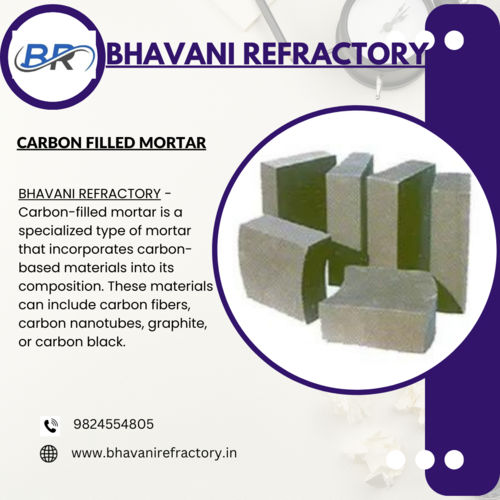

Price:
- 50
- 100
- 200
- 250
- 500
- 1000+
More Products in Acid Proof Mortar Category
Liquid Furan Base Mortar
Price 300 INR / Liter
Minimum Order Quantity : 100 Liters
Application : Used for lining of acidresistant bricks and tiles, chemical process floors, tanks, reaction vessels
Dimensional Stability : Other, Excellent
Shape : Other, Liquid/Paste for onsite mixing
Types of Refractories : Other, Furan Base Mortar
Crack Repair Mortar
Price 25 INR / Kilograms
Minimum Order Quantity : 1 Kilograms
Application : Crack Repair
Dimensional Stability : Other, Not specified in the image
Shape : Other, Powder/Coating Material
Types of Refractories : Acid Proof Mortar, Other
White Mastic Powder
Price 12 INR / Kilograms
Minimum Order Quantity : 2000 Kilograms
Application : Used for sealing and repairing surfaces
Dimensional Stability : Other, Specific details not provided in the image
Shape : Other, Powder form
Types of Refractories : Specific details not provided in the image, Other
CNSL Acid Proof Mortar
Price 25 INR / Kilograms
Minimum Order Quantity : 500 Kilograms
Application : Pharma & Chemical

 English
English Spanish
Spanish French
French German
German Italian
Italian Chinese (Simplified)
Chinese (Simplified) Japanese
Japanese Korean
Korean Arabic
Arabic Portuguese
Portuguese
 Send Inquiry
Send Inquiry
